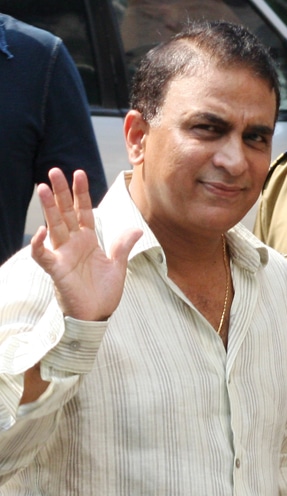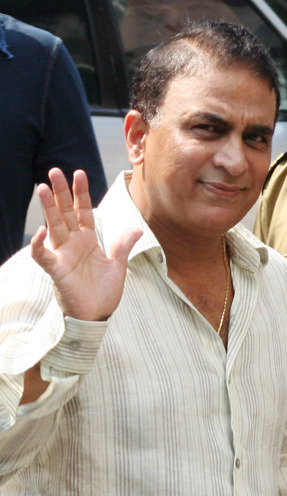Business
Sunny Side

Leadership lessons from cricket legend Sunil Gavaskar.
| According to Sunil Gavaskar, former cricket captain for Team India, success in any vocation requires Three Ds: discipline, which is more mental than physical; dedication to hours of practice; and determination — because, as Gavaskar says, during the time when he was playing the game, “cricket wasn’t a career option.” Today, of course, that last part has changed, with top players earning millions of dollars and corporate sponsors lining up to pay them.
You scored 34 centuries in test cricket and that record was not broken for more than 20 years, if I remember right. For those kinds of achievements, what kind of qualities and attributes do you need to cultivate within yourself? I think focus, determination and a fair amount of discipline — which is not the kind of discipline that is normally associated with having an early night, going to sleep at 10 o’clock and waking up at six. That kind of discipline is important as well, but the discipline to mold your game according to the needs of the situation — you need that kind of discipline. So, these are the elements that are necessary. I would imagine that any vocation, any profession (involves) the three Ds that I believed in — discipline, dedication and determination — and I think those have to be part of you to be able to (go) further. So, explain how you did that in the case of developing your own ability in the cricket? So, you had to balance your studies as well as your cricket, your love for the game, which meant that you had to show dedication to practice (and) the discipline to be able to go back to your books and to study. And I suppose that to be able to do that at an early age, to be able to balance it out, certainly went a long way in helping me in my cricketing career.
It is pretty much the same, in the sense that in business, you have to try and study what the situation is, study the opponent…. I would imagine that there has to be a bit of study, there has to be a lot of hard work involved, and you have to do a lot of (preparation). And I would imagine that is the same thing that you would want to (do in) business: have ambitions — definitely have ambitions — start slowly, and as you settle in, as you start to get the hang of business, then you try and expand…. Did you take a lot of risks in the way you played cricket? No, I do not think so because I was an opening batsman and we were brought up to eschew all risks to be able to play a risk-free cricket (game) as much as possible and tire the bowlers out, so then the batsman coming down, say the number 3, 4, 5 or 4, 5, 6 — the glamour boys, as they call it. We were the plodders, you know, who did all the hard work — paved the road, as you can say, for the guys. We walked the road so that the others could drive a car on it. That is the way we were brought up to play cricket. But I would imagine that your attitude towards risk in the game would also translate to risk in business? I would imagine so, yes … because the upbringing was to be careful to ensure that there was not any risk involved. I would imagine that today it would be totally different, because today — with the T20, where risks are taken in the game right from ball one — if anybody wants to get into business, it would probably be a different kind of atmosphere that he would go into. As a result of your success as a player, you also became the captain of the team. What kind of leadership lessons did that teach you? During the time that you are just a player on the team and looking at the various captains, there are aspects of their captaincy that you like, there are aspects of their captaincy that you do not like, and so you try and keep that in mind when eventually the captaincy comes your way. For example: this guy brought the best out of the team doing it this way — while when he said this or when he did that, the team was not very happy, so you try to avoid that. So learning from your seniors was a big lesson. It taught you how to get the best out of juniors, and maybe how not to treat certain players. Can you give me any examples of the kind of qualities that you liked to emulate, and those you thought weren’t good? Ajit Wadekar was my captain at the state level as well as the international level when I made my debut for India. He had a unique way of trying to get everybody together. If, for example, he wanted to pass a message across — a stern message — he would pass it on to his Mumbai guys, not to the whole team, because (in India), with different languages, different cultures and different way of looking at things, it was important not to hurt anybody’s sentiments. So, he would pass the message on by scolding the Mumbai guys, even if the Mumbai guys had done nothing. But it was his way of passing on a message to the others “to not do this; as a captain, I do not want that.” On the other hand, you had somebody like Tiger Pataudi, who was captain who pretty much let you do what you wanted. He believed in your abilities. So, he was not a guy with a hand on your shoulder. He would sort of let you run … and if you made a mistake and if you came to him, then he was very happy to talk to you (about it). Over a period of time, you tended to sort of see that is how it works — and to try and do it this way. President APJ Abdul Kalam mentioned that one of the most important qualities of a leader is to learn how to manage failure. But managing failure is very, very hard. I remember there was a time when under your captaincy, there were a series of test matches where India lost, and I was wondering whether you learned any lessons from that time period which have stayed with you over the years? Yes, I think the main thing that you learn is never to lose heart — that it is a cycle. Sometimes, the opposition is simply better than you, and you have to give credit to the fact that they might have just played better than you. Then you try and analyze how you could have improved or bettered your performance, (how) you could have been more competitive, and when you do that, you tend to be able to find out where you went wrong…. You mentioned the fact that today, cricket is a career option, especially with the 20-20 and the formation of the IPL. How has the business side of the game changed, and do you think it has changed for the better or are there things that bother you? I think there are more pluses than minuses. Obviously, in any sport there will always be certain minuses, but I believe that (with) the advent of the Indian Premier League, the kind of money that is in the game now certainly is a big plus, because it has encouraged parents who were all the time pushing their talented kids only into education simply because they wanted a degree behind them so they would be able to get a decent job. Now, if they see that their kid has talent, they will say, “Okay, go and play, because there is no age limit for education, but there is age limit for sports.” That is what I told my son, Rohan, as well — that when he was starting to play, you play as much as you want; do not worry about anything else, because you can always study once you have finished with the game…. I think that is one of the biggest pluses that has happened (in cricket), because I do believe that Indian cricket lost out on many a talented player simply because the parents said, “No, we want you to get into a different field, which guarantees you an income.” I know when I played at Bombay University, we had two or three talented players who could have had the ability to don national colors, but midway through they opted to go to medical school because that is where they believed that their future was. Today, the parents and the children do believe that there is a possibility to make a living playing the game of cricket. Well, the biggest challenge is to be able to get the rest of the team to believe in itself, and I think it probably has something to do with the fact that we have had a system in our country — call it the caste system or the class system — whereby some people believe that they are not as good as others. To be able to make them believe in their ability — that their ability is what matters, not the class, not the caste that they come from. I think that has been the biggest challenge. One last question. How do you define success? I wish I could define it. I would imagine that it is a feeling of satisfaction when you have done your job and the feeling of giving it your best, giving it everything, and to be able to put your head on the pillow and sleep peacefully, knowing that you have given it everything. At the end of the day, then, success and failure — as the world terms it — is in the hands of God, but the effort is in your hands. |

